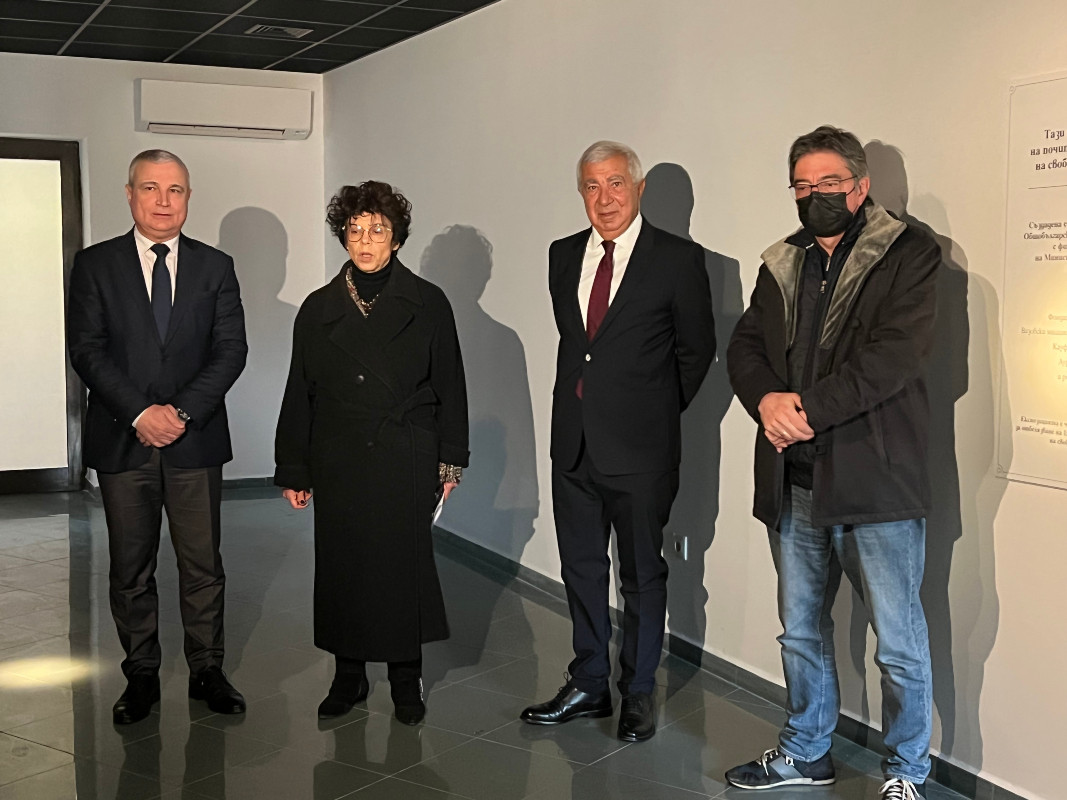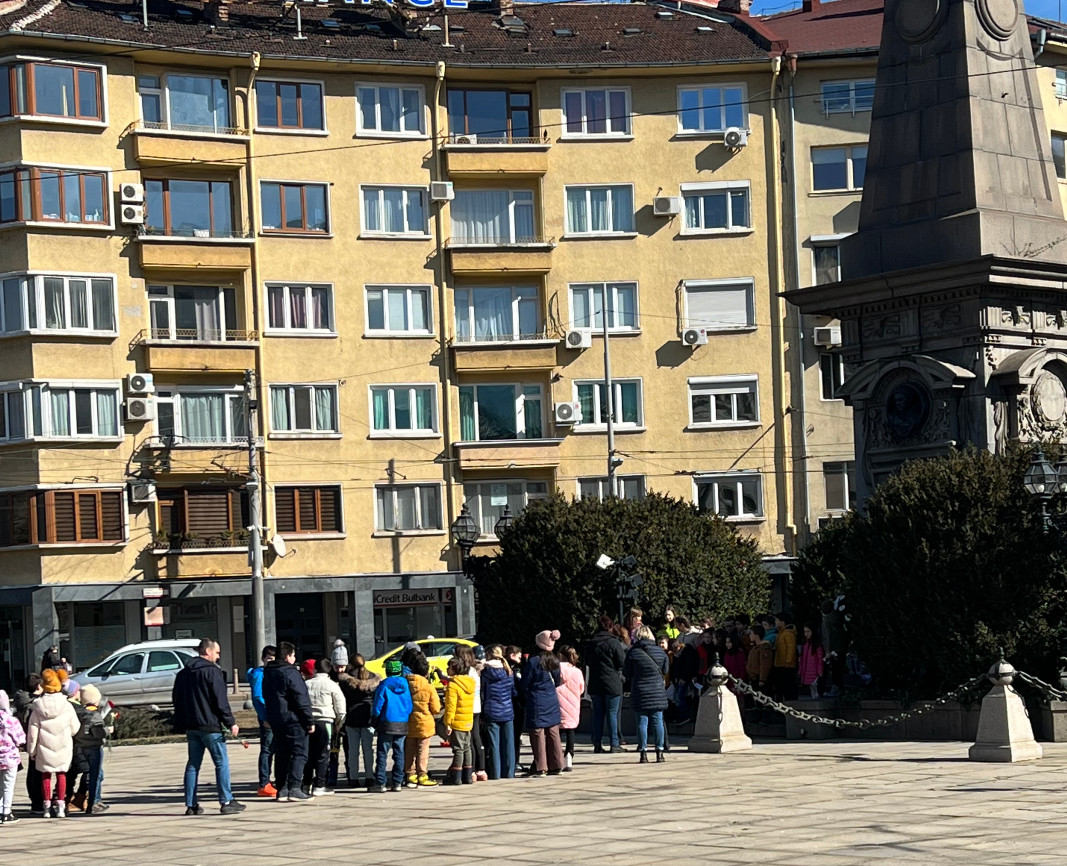"We were under Ottoman rule but now people are different, they are not to blame for the history and it is nice to help them," a teenage girl tells her friend. It becomes clear that the conversation taking place a few meters away from the Monument to the Apostle of Freedom, Vasil Levski, in Sofia is related to the earthquake in Turkey and Syria and its victims
"The time to help is now - latecomers will not be our friends" - Levski to a rich Bulgarian in Wallachia, October 6, 1871.
Students with flowers in their hands walk towards the monument in a row to pay tribute to the great Bulgarian. We also meet Stanka Mladenova, who came with her seven-year-old grandson Denislav.

"Every year we come here, but he's ill now and couldn't come together with his class, so I brought him. He was very excited and had even learned a poem about Levski. He's very proud that he came here."
"What we spoke and wrote yesterday, we must keep in front of our eyes today, so that people do not laugh at us tomorrow" - Vasil Levski
The pride and appreciation is felt strongly today near this memorable place. Near the monument, we see a new art space dedicated to the Apostle - a part of the “Kvadrat 500” National Gallery welcomes us with Levski’s testament and the multimedia exhibition "Levski’s Confession."
“This is a project that offers us emotional closeness with the person behind the image. This is one of the most important elements in the National Program that marks the 150th death anniversary of Bulgaria’s national hero,” Deputy Minister of Culture Assoc. Professor Dr. Plamen Slavov said at the opening.

It took 8 years for the idea that Sofia should have a specific place linked to the memory of Vasil Levski, where young people could come and learn more about and even buy books, to be realized, the chairman of the “Vasil Levski” Committee, Vasil Vassilev, has told Radio Bulgaria. The National Art Gallery is a territory of art and Bulgaria’s national hero is presented not through artifacts and personal belongings, but through artistic techniques.
As soon as one enters the darkened space, they see his covenants written in light, disappearing and reappearing again. Valuable historical books can be seen in the book space, as well as the latest studies and publications with discoveries from the fund of the “Vasil Levski” Committee and the Vasil Levski National Museum in Karlovo. In the small hall important moments from the life of one of the symbols of Bulgarian freedom and unity are revived on a large-scale video wall, through the use of holographic technology.
The place was designed and renovated precisely according to the needs of the multimedia project, producer Ivo Milev says. The setting and atmosphere are complemented by a calm film narrative by director Dimitar Gochev, based on a script by Neli Dimitrova. It aims to show us Levski – the human.
“Of course, a lot of historical documents and research work were needed in the making but this is not a historical film. It is a work of art. It makes suggestions and should work with people's emotions. Knowledge and information come second. This is the role of “Levski's Confession”. It is very difficult to work with the image of Vasil Levski, because this is a person whom everyone has their own personal idea about.
"Deeds are needed, not words," Levski once wrote.
"Levski's ideology, judging by his legacy, is the most correct way to solve our problems today,” Vasil Vassilev says. “Not a single Bulgarian politician seems to understand this. If Bulgarian people can unite, it can only happen around Levski's personality, work and covenants. They can take us forward," the chairman of the "Vasil Levski" Committee says.
Leaving the gallery, we see the Vasil Levski monument in the center of Sofia once again, as well as two elderly women placing roses at its base.

"We left flowers for the Apostle, for his work, for his love for the country; we came to bow and remember him. Every year we do it because we love him, as he loved his homeland," one of them tells us and continues on her way.
"I, Vasil Levski, born in Karlovo, of a Bulgarian hero mother, would not be a Turk or a slave, nor would I watch this happening to my dear family" - from unfinished rhyming autobiography in Vasil Levski’s notebook.
The exhibition will be open throughout 2023 and entrance is free.
Photos: Vesela Krasteva
The publication has been realized under a project implemented with the financial support of the Bulgarian Ministry of Culture, within the framework of the National Program for Commemoration of 150 Years since the Death of Vasil Levski.
The national painting triennial with the theme "Bridges" will bring together 84 contemporary artists who will show 106 works in the Hristo Tsokev Art Gallery in Gabrovo. This year's theme of the exhibition - "Bridges" - includes two aspects,..
The OKO International Ethnographic Film Festival will be held in Sofia in the period November 8 to November 15th. The forum is realized with the support of the National Film Center, Sofia Municipality, the Embassy of Ukraine and the..
For the first time in Sofia, the British show STOMP will perform in Hall 1 of the National Palace of Culture (NDK) from 8 to 10 November 2024. The show, which combines dance, music and theatre, will present its infectious blend of rhythm, drama and..

+359 2 9336 661
